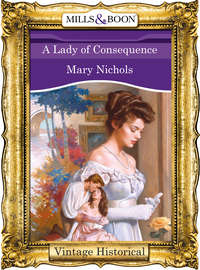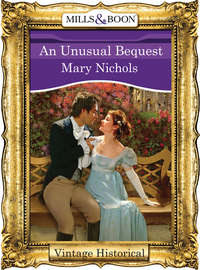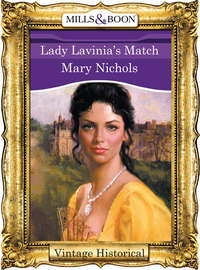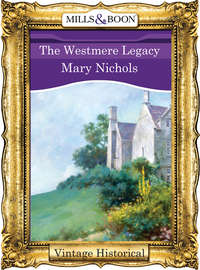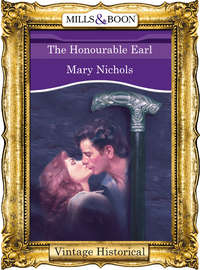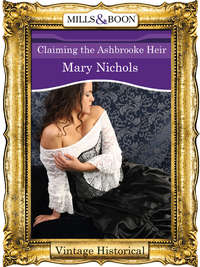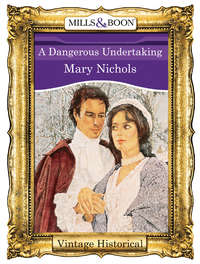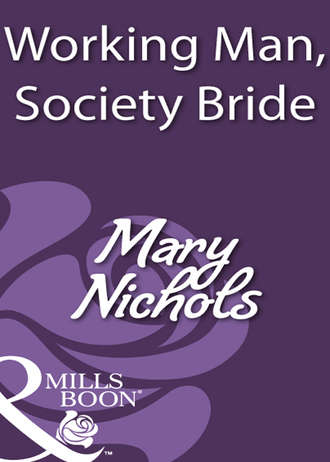
Полная версия
Working Man, Society Bride
‘No, Mama and Papa are taking me to Linwood Park at the invitation of the Viscount. We are going to visit for a few days next month.’
‘Oh, how I envy you.’
Lucy smiled at her younger sister. At fourteen she was not yet out of the schoolroom. ‘Your turn will come.’
‘Not before I’ve had mine,’ Rosemary said. ‘And you can be sure I shall not turn my nose up at someone like Mr Gorridge, simply because he is merely pleasant. Pleasant will do for me if a place like Linwood Park comes with it.’
‘Rosie, how can you say that?’ Esme said. ‘That would be asking to be miserable. Wealth is no guarantee of happiness.’
Rosemary laughed. ‘No, but I could be miserable in comfort. Love is all very well, but it cannot survive in a garret. I certainly should not like it.’
‘It’s a good thing we are not all alike, Rosie,’ Lucy said. ‘Or no poor man would ever marry.’
‘Like marries like,’ Rosemary said flatly. ‘It’s the way it is. A lady cannot marry a labourer, any more than a princess would marry a pauper.’
‘Well, I am determined not to wait until after I’m married to fall in love with my husband,’ Esme put in. ‘Supposing you married someone and then met someone else and fell in love with him, it would be too late, wouldn’t it? I would rather not risk it.’
It was a sentiment with which Lucy concurred. She would give herself a chance to fall in love with Mr Gorridge and she hoped it would happen because, if she refused him, she did not know what her parents would say or do. Did the labouring classes have these problems? she wondered. Did their parents dangle prospective partners in front of them and expect them to marry on the slightest acquaintance? What incentive would there be to do that? They were not encumbered by titles and wealth and the need to marry well. Sometimes she regretted her father’s rank and the need for her to conform. On the other hand, Rosie was right; she would not like living in a garret at all. If garrets were anything like the servants’ rooms on the top floor of Luffenham Hall, they were too small to swing the proverbial cat and where would she keep all her clothes? There wasn’t much chance of that happening, considering she was unlikely to meet a labourer socially. How else did couples meet and fall in love? She resolved to try very hard to love Mr Gorridge and the best way to do that was to concentrate on his good points and ignore those she found less attractive.
As soon as they had finished their meal she told her sisters she was tired after her journey and, dropping a kiss on the cheek of each, went up to bed.
She woke early next morning to the sound of birdsong and, without waiting for the chambermaid, hurried out of bed to draw the curtains. The window looked out on the stable yard; beyond that was a paddock and on the other side of that the park that made up the grounds of the Hall. The village of Luffenham could not be seen from the house because of the screening of trees, but the top of the steeple was visible against a clear blue sky. It was going to be another scorching day. She washed in the cold water left on the wash stand, scrambled into her habit, tied back her hair with a ribbon and pulled on her riding boots. Grabbing her hat, she hurried downstairs to the kitchen.
‘My, you’re about early, Miss Lucy,’ Cook said. ‘I’ve only just started preparing breakfast.’
‘A glass of milk and a piece of toast will do, Mrs Lavender. I’ll have it here, like I used to when I was little. I want to have a ride before it gets too hot.’
‘Miss Lucinda, you are not little any longer. You are a young lady who is well and truly out, and I am not sure your mama would approve of you eating in the kitchen.’
‘Oh, don’t be so stuffy, Mrs L. Besides, Mama is still fast asleep in bed.’ It was said with an engaging smile. ‘If I wait to have breakfast in the dining room, the morning will be half gone.’ And with that she put her hat on the table and sat down, knowing she would have her way. The cook sighed and poured her a glass of creamy milk, just delivered from the cowshed, and pushed a toasting fork into a slice of bread. ‘I’ll do it,’ Lucy said, taking it from her. ‘You get on with whatever you were doing.’ She sat on the fender in front of the range and opened its door to toast the bread.
‘You’ll spoil your complexion sitting so close to the fire,’ Cook said. Her own cheeks were rosy from working in constant heat. ‘Hold something in front of your face.’
Lucy laughed and ignored her. ‘What has been going on while I’ve been away? Has Sally-Ann’s young man proposed yet?’ Sally-Ann was one of the maids who was walking out with a groom. ‘Has your sister had her baby? Have they started haymaking on Home Farm?’
The cook laughed. ‘You don’t change, Miss Lucy. Still as full of questions as ever.’
‘How can I learn if I don’t question?’
‘And that’s another one. In answer to your first, yes, Andrew has proposed, but they’ve decided to wait a year before naming the day, and you are burning that toast.’
Lucy hastily pulled it off the fork and turned it over before holding it to the fire again. ‘And the rest?’
‘My sister has had a boy, but it was touch and go. It was a difficult birth and she lost a great deal of blood and the infant was weak—’ She stopped suddenly, remembering her audience was an unmarried and carefully nurtured young lady. ‘But I should not be telling you such things. Suffice to say he is beginning to put on a little weight now and is to be called Luke after his father. And I forget your last question.’
‘Have they started the haymaking?’
‘I heard they were going to make a start today. Why do you want to know that?’
‘I like to watch the men at work.’
‘Miss Lucy!’ The cook was shocked, knowing, as Lucy did, that the men worked in shirtsleeves, many of them with their sleeves rolled up, displaying muscular arms and, in the absence of collars and ties, a certain amount of neck and chest.
Lucy, laughing, removed the toasted bread from the fork and returned to the table to spread it thickly with butter. ‘There’s no harm in seeing how the work is done. I admire the skill of the men, all working in unison. It must be back-breaking, but they are all so cheerful.’
‘So they would be, considering the wet winter we had and everything so late. They are glad to be working again. Are you sure you won’t have any more to eat? That’s hardly enough to keep you going all morning.’
‘It is quite enough, Cook. For the last two months I’ve had nothing but seven-course meals, tea parties and complicated picnics. I have had my fill of food.’
‘You enjoyed yourself, then?’
‘Oh, yes, it was wonderful, but I’m glad to be home.’ She finished the milk. ‘Now I’m off to have Midge saddled.’ With that she picked up her hat and danced out of the kitchen door, munching the last of the toast as she went.
The outside staff were all busy. Some were working in the garden, others grooming the horses that had brought her and her mother home. Some were cleaning out the carriage; others were saddling up some of the riding horses to exercise them. The horse master had a young colt on a long lead and was training him to answer to the bit. She watched for a moment in admiration and then went into the stables where Midge put her head over one of the doors and snickered. She stroked her nose. ‘Have you missed me, old thing? Well, let’s go and have a good gallop, shall we?’ She opened the door and slipped inside to saddle her.
‘Miss Lucy, I’ll do that for you.’ It was young Andrew, Sally-Ann’s intended.
‘Thank you, Andrew, but, if you are busy, I can do it myself.’
‘Not too busy, miss. I mean, my lady.’ He hurriedly corrected himself, remembering she had just returned from her débutante season in London and that meant she was grown up and a proper lady now and must be treated as such. ‘I must make sure the girth is properly tightened or his lordship will have my head on a plate.’
She laughed. ‘Miss will do fine, Andrew.’ She watched as he deftly saddled the mare. ‘I believe congratulations are in order.’ And, because he looked puzzled, added, ‘I understand you have spoken for Sally-Ann.’
‘Oh, yes, miss, thank you, miss.’ He led the horse out into the yard and bent to clasp his hands for her to mount. ‘Mind how you go. She hasn’t had much exercise lately.’
‘I will.’ She accepted her crop from him and trotted out of the yard towards the drive. Halfway down she turned and cantered across the grass and on to the parkland that surrounded the Hall.
Midge was frisky and Lucy decided that the park was too restricting and made her way to a gate, which led on to a lane. From there, she found her way on to a wide, grassy track between a meadow and a field of growing wheat. Due to a cold, wet spring, the second year in succession, the wheat had struggled to grow and the harvest would be late. She had heard tell that there was new machinery being tried that would do the job of several men and wondered if they would accept that, or would they be afraid of being thrown out of work, as the cotton workers had been a few years before? Life was hard enough for them as it was, what with one poor harvest after another and the price of corn kept artificially high, but how would they fare if farmers began to mechanise jobs that until now had been done by men?
The haymakers were busy in one of the meadows and she reined in for a minute to watch. The men were moving steadily forward, their muscular arms, tanned from the sun, working to an age-old rhythm. Swathe after swathe fell to their scythes and behind them the women raked it out to dry in the sun. She rode on and up on to the heath, where she let the mare have her head and before long they left the cultivated fields behind. The heath was covered in scrub and a few trees, where sheep nibbled at the heather and sparse grass. Skylarks nested up here, and butterflies flitted from flower to flower. Overhead a kestrel hovered.
She drew the horse to a walk as they topped the rise and then stopped to sit, looking down on to a valley with a river snaking along the bottom. Down there were more cultivated fields, and a few farm buildings. Across the valley more sheep grazed on more meadows. It was all her father’s land, acres and acres of it that had been in the family since the Reformation, as he was very fond of telling anyone who would listen. It was good hunting-and-shooting country, too, and later in the year her father would invite friends and relations to stay for a week’s shooting and again just after Christmas for the hunt, as he did every year.
She put her hand up to her face to shade her eyes when she spotted three men in the valley. They were certainly not labourers, because two were dressed in top hats and tailcoats. The third was more casually dressed. They appeared to be examining something on the ground and she spurred her horse down the steep slope towards them, crossed a narrow wooden bridge over the river and cantered up to them. She realised as she drew near that they were using a theodolite and one carried a notebook in which he was making notes. They looked towards her when they heard the horse and the youngest of the three, who had been squatting down examining the ground, stood up.
He was a hugely impressive specimen of manhood. Well over six feet tall, his shoulders were massive, straining the cloth of his tweed tailcoat. His chest was broad and his hips, clad in plain brown trousers, were slim. He wore a loosely tied neckcloth and, unlike the other two, he was hatless. His curly light brown hair was worn collar length. He had large hands that, at the moment she reined in and stopped, were crumbling the soil between his fingers.
He smiled, displaying even, white teeth. ‘Good morning, miss.’ His accent, while by no means uncouth and certainly not betraying the patois of the peasant, was not refined as a gentleman’s would be. She found it difficult to take her eyes off him and, though she knew there were two others present, she was facing him and him alone.
‘What are you doing?’ she asked, without returning his greeting.
‘Surveying, miss.’
‘Surveying what?’
‘The land, miss, for a railway.’
‘Here?’ She was astonished. She had heard her father say more than once that he abominated railways and would not have one on his land, which was inconsistent considering he used trains himself when it suited him.
‘It looks as good a route as any, but we can’t tell until we’ve walked the whole way.’
‘From where to where?’
‘Leicester to Peterborough, to join the Eastern Counties Railway to the Midland.’
‘I find it difficult to believe my father has agreed to it.’
‘And who is your father?’
He did not appear at all overawed, which made her all the more determined to stand on her dignity. ‘The Earl of Luffenham and, before you ask, you are on his land, which, if you are surveying, you surely know already.’
The young man bowed, though it was more a formality than any show of respect. ‘I am sorry—if I had known who you were, my lady, I would have addressed you correctly.’
He saw before him an arrogant child of wealth and class on a superb horse. Judging by the size of the horse and the easy way she sat on it, she was quite tall. Her riding habit, which was spread decorously over her feet, was of dark-blue taffeta with military-style frogging across the jacket. Her tiny riding hat, with its wisp of a veil, was perched on top of dark golden ringlets. Her eyes, looking fearlessly into his, were greeny-grey. He would have liked to despise her, but found himself admiring her spirit. She was evidently not afraid of approaching three men and telling them exactly what she thought of them.
‘That doesn’t answer my question. Has my father agreed?’
‘We are not seeking the agreement of anyone at the moment, my lady. We have yet to establish the feasibility of such a line.’
‘And to do that, it appears you must trespass.’
One of the others gave a little cough, which made her drag her eyes away from the young man towards him. ‘My lady, I think you will find the Earl’s land begins on the other side of the water.’ And he pointed in the direction of the river behind her.
‘It does not. It extends up to that ridge.’ Her riding crop indicated where she meant. ‘This whole area is Luffenham land.’ She swept her arm in a wide arc.
‘Until we see evidence we must beg to differ, my lady.’
‘Then I suggest you apply to the Earl, who will no doubt supply it. In the meantime, desist whatever it is you are doing.’
The youngest man laughed and she swung round to face him again. ‘It is not a laughing matter.’
His amber eyes were alight with amusement. ‘I am sorry, my lady, but we have been given a job to do and we will not meekly leave it on the say-so of a young lady who can have no idea what she is talking about. I suggest you continue your ride and we will talk to your papa when the time is right.’
His condescension infuriated her; though she would have liked to go on arguing, she was not sure enough of her facts, and instead wheeled round and cantered off. Once back over the river, she slowed to a walk, though she did not look back. She was sure that if she did, she would see that they had resumed their inspection of the terrain. She ought to have asked their names so that she could tell her father who they were, but nothing on earth would persuade her to humiliate herself further by turning back to do so.
The man had been insufferably rude and the two others, who were older and should have tried to curb him, had said nothing, except to back him up. But my, he was a handsome devil, all bone and muscle—but he had a warm smile and laughing eyes, which in some measure made up for his insolence. Of course he would not approach her father, that would be done by his superiors, which was a pity because she would have liked to meet him again, if only to confirm her first impressions that he was a conceited brute of a man who had no idea how to behave towards a lady.
She wondered what her father would say when she told him of the encounter. He hated change, anything that might interrupt his ordered way of life, and she had heard him rant against the railways so often, she knew he would send the deputation away and threaten to shoot them if they came back on to his land. And he would be angry with her for even speaking to them, so perhaps it would be best to say nothing. He would find out for himself soon enough.
Myles had not returned to his task, but was standing watching her go, admiring the way she rode, her back held straight, the reins held easily in her gloved hands. He realised he had been arrogant and had not explained carefully enough that he and his colleagues were simply trying to find the best route for the line and that the Earl’s land, far from being compact, was sprawled all over the place, taking in a farm here, a hamlet there, woodland, heath and pasture, as small parcels had been added over the years. A broad strip stuck out like a tongue between the Gorridge estate and the land on the other side, which his father had bought a few years before to build himself a mansion. The railway, if it took the shortest route, which it was almost bound to do because it was costed per mile, would cross straight over that small tongue before going on to the Gorridge estate. Viscount Gorridge had agreed to sell his section to the railway company and had also assured them that he could guarantee that Luffenham would consent to part with his piece of land. He had intimated that he had some influence over the Earl.
‘So that was one of the Earl’s daughters,’ Joe Masters commented. ‘I heard he had three.’
‘I wonder if they are all like her.’
Masters laughed. He was in his fifties and had worked for Myles’s grandfather and father since he was old enough to work at all, which made him more outspoken than most employees. ‘God help the Earl if they are. He has to find husbands for them. And dowries.’
‘Are we really on the Earl’s land?’
He shrugged. ‘Doesn’t matter if we are. If he won’t agree to sell, then the land will be compulsorily purchased—you’ve been in the railway business long enough to know that, haven’t you?’
‘Yes, of course I have, but I hate dissension. It makes for bad feelings all round.’
‘You know your trouble, lad,’ Joe said, laughing. ‘Great lump that you are, you’re too soft.’
‘I’ll show you whether I’m soft or not,’ Myles said, putting up his fists and punching the other man lightly on the shoulder. Martin Waterson, the third man of the party, watched in amusement as they began sparring, though neither would have dreamed of hurting the other.
‘Pax,’ Joe said, holding up his arms in surrender. ‘I give in. You’re not soft.’
Myles, who was hardly out of breath, dropped his hands. ‘Come on, let’s get on with the job. I don’t fancy a run in with the Earl’s men. Not until it becomes necessary, anyway.’
They worked on and by late afternoon had surveyed the land along the valley bottom, which would be the easiest route for the line, and were approaching the village of Luffenham. ‘I reckon this is as far as we need go today,’ Waterson said. ‘I suggest we start again at the other end tomorrow and work our way back to this point. We might find a better route.’
‘Right. We’ll call it a day,’ Myles said, finishing his notes and putting them in his pocket.
After arranging where to meet, they mounted the horses they had been leading and went their separate ways. Masters and Waterson went north where they had lodgings while Myles rode home over the hills on a huge black stallion called Trojan, which his father had bought for him four years before on his twenty-first birthday. ‘The size you’re getting, you need a big horse,’ he had said. ‘I’m blowed if I know where you get it from. I’m not much above average in height. As for your mother, she’s tiny. Must be a throw-back to some distant ancestor.’
His mother’s ancestry was unquestionable. She was the daughter of Viscount Porson, the last of a long line, which had not thrived in the way the Gorridges and Luffenhams had thrived. His lordship had been glad enough to let his daughter marry the son of a mill owner with no pretensions to being a gentleman, but who had become wealthy through business. It was that money, and a generous contribution to Wellington’s army in the shape of uniforms, that had led to his being created a baron. Myles could just remember his grandfather, who worked all the hours God made, driven by ambition and a fear that whatever wealth he had created could disappear in a puff of wind and he would be back where he started. It was a trait he had passed on to his son, Myles’s father.
‘My father worked himself into the ground,’ Henry Moorcroft told his own son. ‘He was either at the mill or the factory every morning before seven and we didn’t see him home again until late evening. His efforts meant I could be educated and learn new ways, but that doesn’t mean I could take my ease. I worked, too, and so must you. You can take your pick where you start, but start at the bottom you will.’
Of his father’s many interests, Myles could have chosen the woollen mill in Leicestershire where the original fortune had been made, or the engineering works in Peterborough, but he had plumped for building railways, which his father had only then begun to contract for. They were the transport of the future and the whole concept excited him. Starting at the bottom, he had become a navvy and developed muscles, along with a clear understanding of how the men worked, shifting tons of rubble every day with nothing but picks and shovels. He had discovered how they lived, married and looked after their children. Under the tutelage of the contractors employed by his father, he had learned about explosives, cuttings and viaducts, bridges and tunnels, about surveying and costing and keeping within a budget, which was of prime importance if the shareholders were to be paid. He considered himself the complete railway man.
He had been so busy he had had little time for the ladies, but he supposed that sooner or later he would have to begin thinking about marriage. His father, who was still rooted in his working-class past, would not care in the least whom he chose, so long as she was not extravagantly frivolous, but his mother might be more particular that he chose someone of breeding. The Earl’s daughter certainly had breeding, but was she frivolous? Judging by the riding habit she was wearing, she was certainly accustomed to extravagance. She was spirited, too, but he could deal with that.
His laughter rang out, startling a flock of starlings who had settled on a tree beside the road. What on earth had made him think of her, the spoilt child of a stick-in-the-mud peer, who would certainly not consider him a suitable husband for his elegant daughter? He would probably never meet her again. On the other hand, if he had cause to visit the Earl on railway business…He laughed again, raising his face to the sun. You never could tell.
Chapter Two
The Earl of Luffenham arrived home that evening in time to take dinner with his family. He was, Lucy noticed, not in a good mood. He snapped at the servants and criticised Rosemary’s gown, saying it was unsuitable for a young lady not yet out. ‘What is that shiny stuff?’ he asked.
‘Taffeta, Papa.’
‘What’s wrong with muslin?’
‘Nothing for day wear, Papa, but it is not the thing for dining.’
‘You are getting above yourself, miss, and I wonder at you, madam, for allowing it.’ This last was addressed to his wife.
‘It is not new, my lord,’ she explained. ‘It is one of mine I had remade. That deep pink colour suits Rosie and I thought it would recompense her a little for not having all the new clothes Lucy has had this year.’
Slightly mollified, he grunted and nodded at the footman to begin serving. His economies seemed unnecessary and inconsistent to Lucy. He grumbled about money spent on clothes, yet would never have dreamed of managing with fewer servants, particularly those, like the footmen, who were seen by visitors. He insisted on frugality at family meals, having only four courses, but, when entertaining, the food on his table was lavish in the extreme. His horses were the best money could buy, his hospitality at the annual hunt meeting was legendary, but he begrudged the repairs to his farmer-tenants’ buildings, maintaining that if they let them go to rack and ruin, why should he have to stump up for their negligence?


